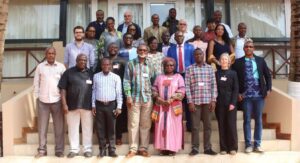ECOWAS SSRG Training Workshop Report – The Gambia
Secret Societies and Women’s Access to Justice in Sierra Leone – Bridging the Formal and Informal Divide
La confrérie des chasseurs traditionneLs dozos en Côte d’Ivoire enjeux socio culturels et dynamiques sécuritaires
Informalité et hybridité au sein des forces de défense de Côte d’Ivoire
Securing Pride – Sexuality, Security and the Post Apartheid State
Policing Actors, Plural Processes and Hybridisation – Histories of Everyday Policing Practice in Central Nigeria
Hybrid Security Governance Responses to Crises – The Case of the Ebola Response in Sierra Leone
Report of the Hybrid Security Governance in Africa Terminal Project Conference
Overview
The terminal conference of the Hybrid Security Governance in Africa research project (HSG) was held in Accra, Ghana, from 21-22 July 2017. As with previous gatherings, it was organised by the African Security Sector Network (ASSN) with support from the International Development Research Centre (IDRC).
Launched in early 2013, the HSG emerged from acknowledged tensions between SSR’s preponderant focus on state mechanisms despite growing recognition of the involvement of non-state security actors and of reciprocal influences between both groups. The project thus set out, guided by the underlisted broad research questions, to research the ‘complex amalgam of formal and informal, statutory and non-statutory actors and institutions’ which together constitute what it terms ‘hybrid security orders’.
- How do informal norms, solidarities and networks become embedded in the official security, policing and justice institutions of African states? In what ways are they instrumentalised by elites? And in what ways does this influence their capacity to provide security and protect the rights of citizens?
- What roles do ‘non-state’ or ‘informal’ actors and institutions play in security, policing and justice; and how do they interface with the formal security institutions of the state?
- What is the impact of hybrid security orders on the security and entitlements of citizens in African states and in particular on vulnerable and excluded people and communities? In what ways if any do they foster more effective, equitable and accountable security provision? Or do they instead reinforce existing inequalities and local-level disempowerment?
- How can effective, inclusive and accountable security, policing and justice be negotiated in contexts of hybridity and informality, and foster new forms of public authority better suited to African realities?
Insecurity in Mali and Sudan pared an original list of eight countries down to six: Côte d’Ivoire, Liberia, Nigeria, Sierra Leone (two papers), Somaliland, and South Africa. A detailed project description, periodic meeting reports (includes agendas and participant lists), and all knowledge products from the HSG can be accessed free online here on the ASSN website.
At this final convening in addition to regular project members, researchers and advisors, the team was pleased to welcome and engage with a multinational mix of activists, academics, and regional policymakers who contributed actively and critically to the enriching discussions. Following presentations and discussions of the various country case studies, participants focused on considerations of the implications for their respective work of the findings from the project. The central outcomes of this conversation are distilled on pages 26-30 and will continue to serve as reflection for all participants, including the IDRC, represented by Programme Officer Ms. Ramata Thioune, who intimated that the research findings and conference outcomes would inform subsequent internal meetings at the IDRC.
The keen interest shown by HSG members as well as associates during its three and half years’ span indicate the salience of the notion of hybridity in security and, as was remarked continually, a need for further research in an even more diverse array of countries—perhaps not only in Africa.
Download Report

